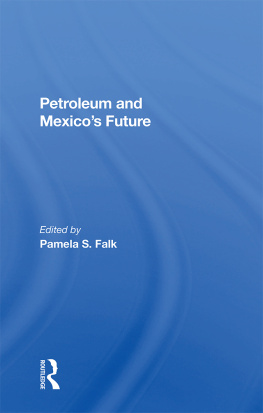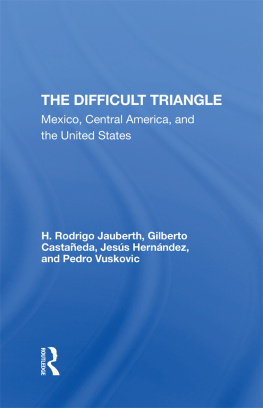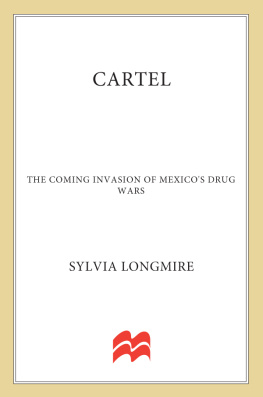
Mexicos Uneven Development
Mexico and the United States may be neighbors, but their economies offer stark contrasts. In Mexicos Uneven Development: The Geographical and Historical Context of Inequality, Oscar J. Martnez explores Mexicos history to explain why Mexico remains less developed than the United States. Weaving in stories from his own experiences growing up along the U.S.Mexico border, Martnez shows how the foundational factors of external relations, the natural environment, the structures of production and governance, natural resources, and population dynamics have all played roles in shaping the Mexican economy. This interesting and thought-provoking study clearly and convincingly explains the issues that affect Mexicos underdevelopment. It will prove invaluable to anyone studying Mexicos past or interested in its future.
Oscar J. Martnez is a Regents Professor of History at the University of Arizona. His previous books include Troublesome Border and Mexican-Origin People in the United States: A Topical History.
Mexicos Uneven Development
The Geographical and Historical Context of Inequality
Oscar J. Martnez
First published 2016
by Routledge
711 Third Avenue, New York, NY 10017
And by Routledge
2 Park Square, Milton Park, Abingdon, Oxon OX14 4RN
Routledge is an imprint of the Taylor & Francis Group, an informa business
2016 Taylor & Francis
The right of Oscar J. Martnez to be identified as author of this work has been asserted by him in accordance with sections 77 and 78 of the Copyright, Designs and Patents Act 1988.
All rights reserved. No part of this book may be reprinted or reproduced or utilised in any form or by any electronic, mechanical, or other means, now known or hereafter invented, including photocopying and recording, or in any information storage or retrieval system, without permission in writing from the publishers.
Trademark notice: Product or corporate names may be trademarks or registered trademarks, and are used only for identification and explanation without intent to infringe.
Library of Congress Cataloging-in-Publication Data
Martnez, Oscar J. (Oscar Jquez), 1943author.
Mexicos uneven development : the geographical and historical context of inequality / Oscar J. Martnez.
pages cm
Includes bibliographical references and index.
1.MexicoEconomic conditions.2.MexicoSocial conditions.3.MexicoPolitics and government.4.MexicoHistory.5.United StatesEconomic conditions.6.United StatesSocial conditions.I.Title.
HC133.M36 2015
330.972dc23
2015009268
ISBN: 978-1-138-84022-5 (hbk)
ISBN: 978-1-138-84023-2 (pbk)
ISBN: 978-1-315-73265-7 (ebk)
Typeset in Bembo
by Apex CoVantage, LLC
For Virginia
Contents
Part I
The MexicoU.S. Divide
Part II
Context: Nature and People
Part III
Context: External Relations
I am indebted to many people who, over the course of two decades, have helped me bring this book to fruition. In particular I thank John M. Hart, Richard Rhoda, Amanda B. Krause, and the Routledge anonymous reviewers for their careful reading of the entire manuscript and for passing along valuable suggestions that have improved the final product. James Peach, Ed Williams, Christopher Brown, David Gibbs, David Ortiz, and Kathy Staudt read portions of the manuscript and generously offered insightful comments. Al Bergesen kindly shared materials that proved helpful in my own formulation of geographic interpretations, while Jared Diamond graciously gave me ideas on how to make an academic book more reader-friendly.
I express my gratitude to Chris Miller, Becky Eden, and Geronimo Garca for their superb cartographic work, and to numerous librarians who assisted me in locating hard-to-get source materials, especially staff at the University of Arizona, the University of Texas at El Paso, and Yale University. My appreciation as well to Molly Molloy, whose postings on her frontera-list proved vital for gathering data on current conditions in Mexico.
My thanks to Ignacio Medina Nuez and Manuel Flores Robles for the invaluable information and leads they provided during my research visit to Guadalajara, Mexico.
And to my children, Jamie, Gabriel, Daniel, David, and Andy, muchas gracias for having the patience to listen to my views on Mexico and the United States, and for taking time to read chapters and offering commentary. I owe the greatest debt to my wife, Virginia, whose support over the years, as well as insights, research assistance, and editorial help have contributed so much to shaping the book.
Oscar J. Martnez
While growing up in Ciudad Jurez, Chihuahua, Mexico, during the 1950s, I frequently crossed the international border into El Paso, Texas, United States, and noticed the differences between the two cities. El Paso had an impressive skyline. Modern buses and automobiles circulated in an orderly fashion along the citys wide streets and avenues. Large numbers of El Pasoans lived in attractive, spacious homes in nice neighborhoods. By comparison, Jurez had no tall buildings, traffic was chaotic, many streets were unpaved, old smoking buses and trucks rumbled on the roadways, horse-drawn wagons competed with motorists on major streets, impoverished colonias (neighborhoods) took up much of the space in the city, and there were few middle- and upper-class neighborhoods. Many marginalized juarenses (Jurez residents), including my own family, yearned to live in the United States because of its higher standard of living and greater economic opportunities. After many trips back and forthboth legally and illegallybetween the two countries, in 1957 my parents and their six children finally became permanent legal U.S. residents.
The contrast between Jurez and El Paso then, as well as now, mirrors the gulf that has separated Mexico and the United States historically. Jurez, reflecting many of the problems that have afflicted Mexico as a whole, has been predominantly poor and heavily dependent on foreigners for its economic well-being. El Paso, despite having large numbers of poor immigrants as part of its population, has enjoyed a much higher standard of living than Jurez and has been the dominant partner in an interdependent but asymmetrical twin-city economic relationship. Juarenses have been particularly vulnerable to the vagaries of the U.S. and global economies. Economic downturns have occurred with regularity, bringing devastation to their city.1
Why is El Paso so much more prosperous than Jurez? Most people whom I have interviewed informally on both sides of the border feel that El Paso is more affluent because it is a part of the United States, which they believe is a forward-looking, progressive country, and that Jurez is poorer because it is a part of Mexico, which lacks energy and dynamism. If asked for specifics regarding the sources of Mexicos backwardness and Jurezs poverty, some respondents usually mention government incompetence, others bring up corruption, and still others claim that Mexicans suffer from cultural deficiencies. Such negative views about Mexico and Mexicans are shared by many public figures, analysts, and even scholars.







